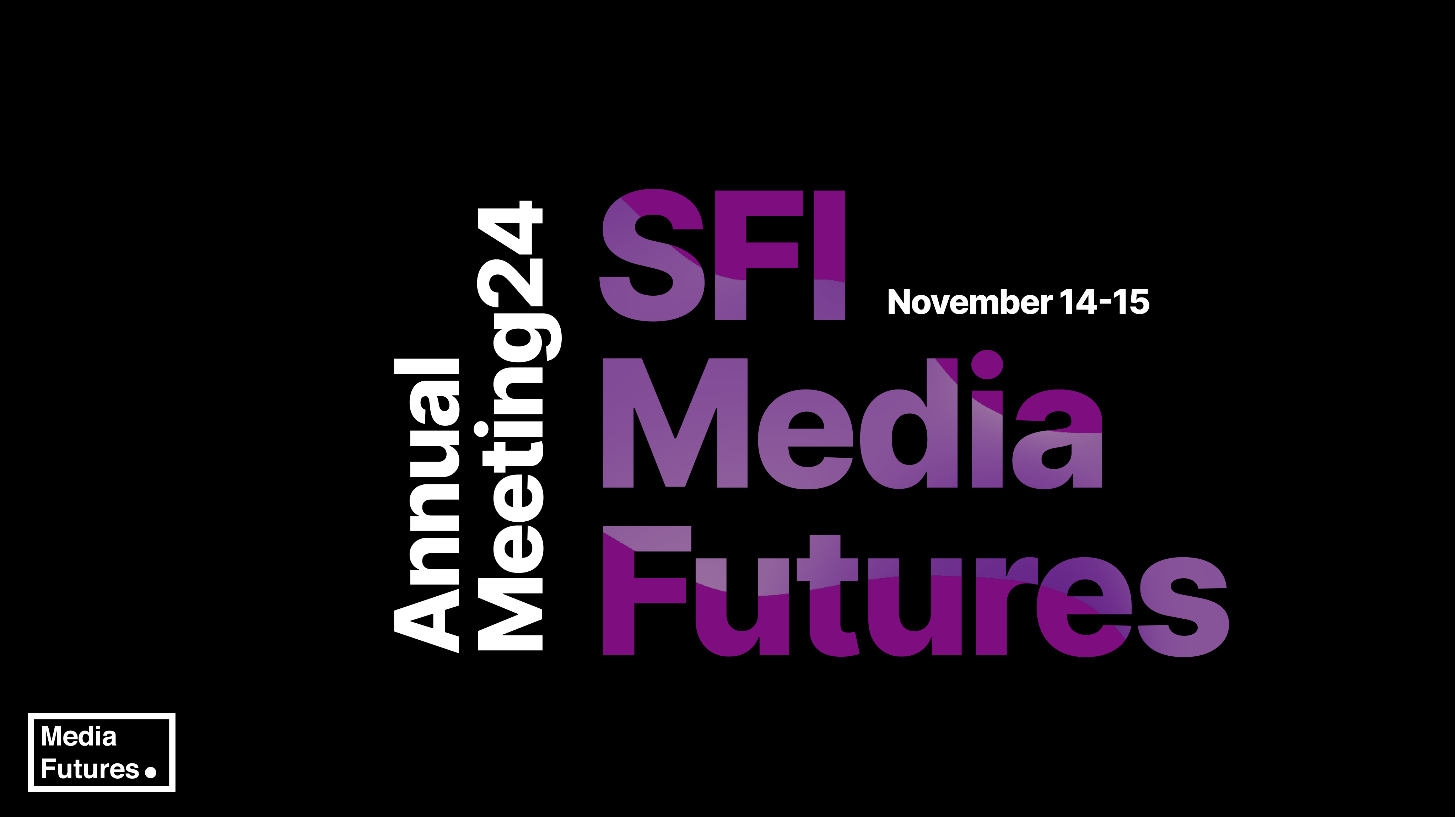
Annual Meeting 2024
November 14 @ 09:00 - November 15 @ 17:00

MediaFutures is a centre for research-based innovation with the goal to develop responsible media technology, leveraging AI technology, for the media sector.
The centre is a consortium of the most important media players in Norway. The University of Bergen is the host of the centre. User partners include NRK and TV 2, the two main TV broadcasters in Norway, Schibsted, including Bergens Tidende (BT), and Amedia, the two largest news media houses in Scandinavia/Norway, as well as the world-renowned Norwegian media tech companies Vizrt and Faktisk.no. The centre collaborates with renowned national research institutions including the University of Oslo, the University of Stavanger and NORCE, and works together with high-profile international research institutions.
This years Media Futures Annual Meeting will be held at November 14-15 at Scandic Ørnen, Bergen in Norway. The 2024 Annual Meeting constitutes a forum for the exchange of scientific results and industry insights within the field of responsible media technology.
This year’s focus topic are Trust and Usability of Generative AI .
Following last year’s success, the 2024 Annual Meeting is expected once again to attract, and bring together Norwegian and international researchers, and industry practitioners with the intent of engaging in discussions on different topics.
Join us for inspirational keynote talks, prototype demonstrations, presentations held by our researchers, and industry partners, and poster session.
We are pleased to announce the first two high-profile keynote speakers: Vanessa Murdock, Sr. Applied Science Manager at Amazon and Alex Jaimes, Chief Scientist and Senior Vice President at AI at Dataminr.
More infos to come.
KEYNOTE SPEAKERS

Vanessa Murdock
Sr Manager Applied Science - Amazon Web Services
Vanessa Murdock leads a research group in Alexa Shopping at Amazon, focusing on recommender systems, search, and human-computer interaction (HCI). Her team develops the machine learning algorithms that power Amazon’s Choice and the Alexa Shopping list.
Before joining Amazon, she was a Principal Scientist at Microsoft, where she worked on location inference and notifications for Bing and Cortana. Prior to that, Murdock led the Geographic Context and Experience Group at Yahoo! Research in Barcelona, conducting research in geographic information retrieval and user-generated content.
Murdock holds 19 patents, with over 20 more patent applications pending, which earned her the Master Inventor Award from Yahoo! in 2012. In 2014, she received the Outstanding Achievement by a Young Alum Award from the University of Massachusetts. She completed her Ph.D. in Computer Science at the University of Massachusetts Amherst in 2006, under the supervision of Bruce Croft. Currently, she is a Senior Science Manager, leading teams of Applied and Data Scientists, collaborating with engineering and product management to drive innovation in conversational AI and content moderation for generative AI.

Alejandro (Alex) Jaimes
Chief AI Officer - Dataminr
Alex Jaimes is the Chief Scientist and Senior Vice President of AI at Dataminr. His work centers on blending qualitative and quantitative approaches to understand user behavior and drive product innovation.
With over 15 years of global experience, Alex has contributed to research with real-world impact at companies such as Yahoo, KAIST, Telefónica, IDIAP-EPFL, Fuji Xerox, IBM, Siemens, and AT&T Bell Labs. Previously, he served as Head of R&D at DigitalOcean, CTO at AiCure, and Director of Research and Video Products at Yahoo, where he led teams of scientists and engineers across New York City, Sunnyvale, Bangalore, and Barcelona.
He has also been a visiting professor at KAIST. A prolific author, Alex has published extensively in top conferences like KDD, WWW, RecSys, CVPR, and ACM Multimedia, and is a regular speaker at international academic and industry events. He earned his Ph.D. from Columbia University.
PROGRAM
Day 1
| OPENING SESSION | |
| 09:00 | Registration Opens & Steering Board Meeting Starts |
| 10:00 | Announcements & Event Information |
| 10:15 | Book Launch |
| 10:45 | Moderated QA |
| 11:00 | Reynir Study Results/ Presentation of Study |
| 12:00 | Lunch |
| 13:00 | Welcome Address |
| KEYNOTE SESSION | |
| 13:15 | First Keynote Speech |
| 13:45 | Moderated QA / Questions from the audience via tool + prepared Moderation |
| 14:00 | Coffee Break |
| 14:15 | Second Keynote Speech |
| 14:45 | Moderated QA |
| 15:00 | Coffee break / Poetry Slam (7-10 minutes) |
| PANEL SESSION | |
| 15:15 | Panel Debate: “Tackling Mis-/ Disinformation; its impact on public trust/discurse |
| 16:15 | End |
| 19:00 | Conference Dinner (Scandic Ørnen) |
Day 2
| 09:45 | Coffee & Registration. |
| 10:00 | Information & Announcements. |
| TALK SESSION | |
| 10:45 | Third Speech |
| 11:45 | Moderated QA |
| 11:00 | Fourth Speech |
| 12:00 | Lunch |
| DEMO AND POSTER SESSION | |
| 13:00 | Exhibition and Demo pitches. |
| 14:30 | Finish of Demo & Poster Exhibition. |
| 14:45 | Award |
| CLOSING SESSION | |
| 16:00 | End. |
LOCATION
Both days of the Annual Meeting will take place at the Conference Centre at Scandic Ørnen.
Scandic Ørnen is located in Lars Hilles Gate 18, right next to the main bus terminal.
The closest public transport stop is “Bergen Busstasjon”, the main bus terminal.

https://maps.app.goo.gl/oHBxMur84ReqdFVx7
EXHIBITION AND DEMO PITCHES
Demos presented by
| Khadiga Seddik |
| Bilal Mahmood |
| Astrid Tessem |
| Fazle Rabbi & Svenja Forstner |
| Pete Andrews |
| Huiling You & Svenja Forstner |
